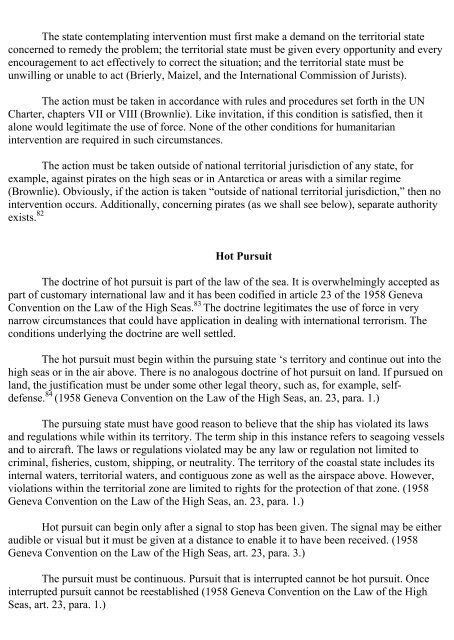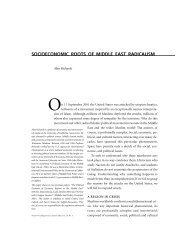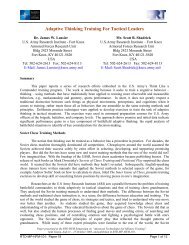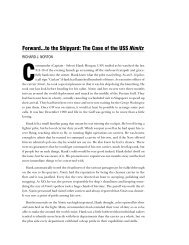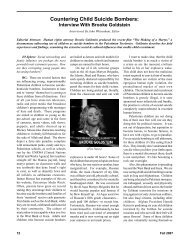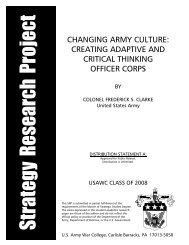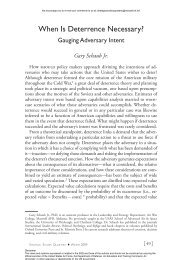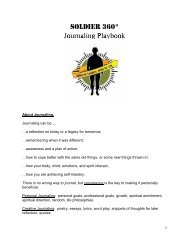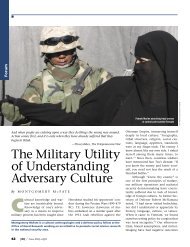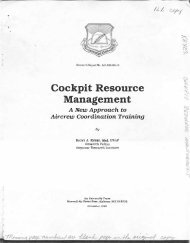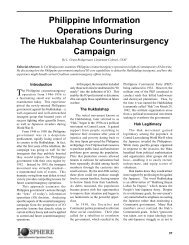Legitimate use of military force against state-sponsored - Air University
Legitimate use of military force against state-sponsored - Air University
Legitimate use of military force against state-sponsored - Air University
You also want an ePaper? Increase the reach of your titles
YUMPU automatically turns print PDFs into web optimized ePapers that Google loves.
The <strong>state</strong> contemplating intervention must first make a demand on the territorial <strong>state</strong><br />
concerned to remedy the problem; the territorial <strong>state</strong> must be given every opportunity and every<br />
encouragement to act effectively to correct the situation; and the territorial <strong>state</strong> must be<br />
unwilling or unable to act (Brierly, Maizel, and the International Commission <strong>of</strong> Jurists).<br />
The action must be taken in accordance with rules and procedures set forth in the UN<br />
Charter, chapters VII or VIII (Brownlie). Like invitation, if this condition is satisfied, then it<br />
alone would legitimate the <strong>use</strong> <strong>of</strong> <strong>force</strong>. None <strong>of</strong> the other conditions for humanitarian<br />
intervention are required in such circumstances.<br />
The action must be taken outside <strong>of</strong> national territorial jurisdiction <strong>of</strong> any <strong>state</strong>, for<br />
example, <strong>against</strong> pirates on the high seas or in Antarctica or areas with a similar regime<br />
(Brownlie). Obviously, if the action is taken “outside <strong>of</strong> national territorial jurisdiction,” then no<br />
intervention occurs. Additionally, concerning pirates (as we shall see below), separate authority<br />
exists. 82<br />
Hot Pursuit<br />
The doctrine <strong>of</strong> hot pursuit is part <strong>of</strong> the law <strong>of</strong> the sea. It is overwhelmingly accepted as<br />
part <strong>of</strong> customary international law and it has been codified in article 23 <strong>of</strong> the 1958 Geneva<br />
Convention on the Law <strong>of</strong> the High Seas. 83 The doctrine legitimates the <strong>use</strong> <strong>of</strong> <strong>force</strong> in very<br />
narrow circumstances that could have application in dealing with international terrorism. The<br />
conditions underlying the doctrine are well settled.<br />
The hot pursuit must begin within the pursuing <strong>state</strong> ‘s territory and continue out into the<br />
high seas or in the air above. There is no analogous doctrine <strong>of</strong> hot pursuit on land. If pursued on<br />
land, the justification must be under some other legal theory, such as, for example, selfdefense.<br />
84 (1958 Geneva Convention on the Law <strong>of</strong> the High Seas, an. 23, para. 1.)<br />
The pursuing <strong>state</strong> must have good reason to believe that the ship has violated its laws<br />
and regulations while within its territory. The term ship in this instance refers to seagoing vessels<br />
and to aircraft. The laws or regulations violated may be any law or regulation not limited to<br />
criminal, fisheries, custom, shipping, or neutrality. The territory <strong>of</strong> the coastal <strong>state</strong> includes its<br />
internal waters, territorial waters, and contiguous zone as well as the airspace above. However,<br />
violations within the territorial zone are limited to rights for the protection <strong>of</strong> that zone. (1958<br />
Geneva Convention on the Law <strong>of</strong> the High Seas, an. 23, para. 1.)<br />
Hot pursuit can begin only after a signal to stop has been given. The signal may be either<br />
audible or visual but it must be given at a distance to enable it to have been received. (1958<br />
Geneva Convention on the Law <strong>of</strong> the High Seas, art. 23, para. 3.)<br />
The pursuit must be continuous. Pursuit that is interrupted cannot be hot pursuit. Once<br />
interrupted pursuit cannot be reestablished (1958 Geneva Convention on the Law <strong>of</strong> the High<br />
Seas, art. 23, para. 1.)


